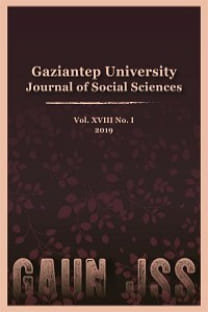Jeanette Winterson’s the stone gods: A postmodern warning
Jeanette Winterson 2007 tarihli Taş Tanrılar adlı romanında dünyanın yaklaşmakta olan sonunu ekolojik olarak değerlendirirken aynı zamanda insanlık durumunu analiz eder. Taş Tanrılar, Winterson’un 2005 yılında çıkardığı, uzay ve evren ilişkisine göndermeler yaptığı Ağırlık adlı romanının devamı gibi okunabilir. Taş Tanrılar, yapı olarak ne kadar postmodern gibi dursa da aslında bir yanıyla insanlık durumuna, insanın kaybolan hayallerine, gelecek umutlarına ve gerçeklik algısına, diğer yanıyla da dünyamızın bozulmakta olan ekolojik dengesine bir ağıt niteliğindedir. Romanda, uzak bir gelecekte yaşayan Orbus diyarının sakinleri gayri insani özellikleriyle betimlenir. Bu insanlar için yaşlanma sadece DNA’da görülen bir sistem hatasıdır ve kolaylıkla onarılabilir. Bu çalışma Winterson’un postmodern yüzeyselliğe, görüntü saplantısına, umut eksikliğine, bellek ve vicdan yitimine bakışını incelemeyi hedeflemektedir. Romanın postmodern, parodik ve oyunbaz yapısının altında gizlenen yergi unsurlarına ve yeni milenyum insanına yaptığı eleştirilere de ışık tutulacaktır.
Jeanette Winterson’un taş tanrılar’ı: Postmodern bir uyarı
Jeanette Winterson attempts to provoke a new consciousness of existence in her 2007 novel The Stone Gods and stir the masses to re-evaluate the human condition under the encroaching shadow of death awaiting our mother earth. The Stone Gods can be read as the continuation of her 2005 novel Weight where she already implied an alternative perception of space/universe. Along with its apparent postmodern tissue, The Stone Gods offers a lament for the human condition which is acutely suffering from the deprivation of dreams, future hopes and sense of reality on one hand, the ongoing corruption of our ecological system on the other. In the novel the citizens of Orbus (an unknown future world) are presented as dehumanized figures for whom “age is only an information failure” stemming from the body’s loss of fluency, nerve disconnection and cell mutation occuring in DNA nucleus. This paper aims at analysing how Winterson detects the postmodern superficiality, obsession with appearance, lack of hope, memory and conscience in The Stone Gods which, contrary to being a postmodern text, concentrates on giving a moral message with its satiric as well as parodic double voice about the changing experience of ageing for man and mother earth in the new millenium.
___
- Baudrillard, J. (1988). America. Trans. Chris Turner. London: Verso, 1988.
- Baudrillard, J. (1991). Simulacra and Simulation. Trans. Sheila Faria Glaser. USA: The University of Michigan Press.
- Baudrillard, J. (1996). The System of Objects. London: Verso, 1996.
- Dennison, M. (2011). The Stone Gods by Jeanette Winterson. Book Review. www.timesonline.com.uk accessed on 29.03.2011
- Ortega y Gasset, J. (1961). The Revolt of the Masses. London: Unwin Books.
- Harraway, D. J. (1991). Simians, Cyborgs and Woman: The Reinvention of Nature. London: Free Association Books.
- Kellner, D, (1989). Jean Baudrillard: From Marxism to Postmodernism and Beyond. Cambridge: Polity Press.
- Lyotard, J.F.( 1998). The Inhuman: Reflections on Time. Trans. Geoffrey Bennington&Rachel Bowlby. UK: Polity Press.
- Pefanis, J. (1991). Heterology and the Postmodern. Durham and London: Duke University Press.
- Winterson, J. (2007). The Stone Gods. London: Harcourt Inc.
- Winterson, J. (2011).On The Stone Gods, on her webpage: Accesse d on: 29.03.2011 http://www.jeanettewinterson.com/pages/content/index.asp?PageID=471
- ISSN: 1303-0094
- Yayın Aralığı: Yılda 4 Sayı
- Başlangıç: 1991
- Yayıncı: Gaziantep Üniv. Sosyal Bilimler Enst.
Sayıdaki Diğer Makaleler
Perfectionism among Turkish secondary students
Yatılı İlköğretim Bölge Okulları Sorunlarının Öğrenci Algılarına Göre Değerlendirilmesi
Jeanette Winterson’un Taş Tanrılar’ı: Postmodern Bir Uyarı
Yeni Teknoloji Temelli Firmaların Ekonomi Politiği
Ahmet Hâşim’in “Frankfurt Seyahatnamesi”nde Batı İmajı
İlköğretim Matematik Öğretmen Adaylarının Matematiksel Problem Çözmede Kullandıkları Temsiller
Türk Ortaöğretim Öğrencilerinde Mükemmeliyetçilik
